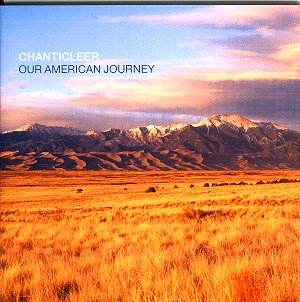The twelve-strong male voice ensemble, Chanticleer,
offer here an eclectic survey of some elements of American music covering
a period of nearly four centuries.
I should say, at the outset, that in terms of sheer
excellence of execution this is just about the finest disc of choral
music to have come my way for quite some time. Balance, tuning, diction
and tone quality are flawless and if you are an admirer of this ensemble
you probably need read no further. However, if the quality of the singing
is consistently at the highest level the repertoire is a bit more variable
and some items may not appeal to all tastes.
The earlier repertoire is uniformly successful as far
as I am concerned. The opening ‘Guide me, O Thou Great Jehovah’ is about
as far as one could get from Cym Rhonnda. The familiar text is
sung a capella (as is everything on the disc except the last
item of all) and the traditional melody heard here is uncommonly haunting.
The two following items are both from the Spanish American polyphonic
tradition. ‘Credidi’ (track 2), a setting of Psalm 115 employs two four-part
choirs and the strands of polyphony build impressively and, it seems,
inexorably to an exuberant ‘Gloria Patri’. The motet by Padilla (track
3) forms an excellent contrast, being more solemn and reflective. Both
pieces receive performances which are beautifully judged.
William Billing’s ‘David’s Lamentation’ (track 5) has
a searing opening and some listeners may be disconcerted, as I was on
first hearing, by the plangent, nasal tone of the falsettists on the
top line. I was not entirely persuaded by what I assume to be an authentic,
period New England accent adopted by the singers. This is far removed
from Thomas Weelkes but it’s a fine piece. What I might call the "primitive"
American accent sits more easily, I think, with Cagle’s ‘Soar Away’
(track 6), an early twentieth century slant on the old shape-note style
of singing. It’s a robust piece which is strongly projected by Chanticleer.
The programme then moves into more contemporary repertoire
and here, I think, the content is of more mixed interest. I was greatly
taken with Steven Stucky’s ‘Whispers’ (track 7), an ingenious piece
which takes as its inspiration William Byrd’s motet Ave Verum Corpus
(1605). Stucky refracts Byrd’s music as it were through a prism in a
most affecting and atmospheric setting of words by Walt Whitman. It
sounds fiendishly difficult to sing but clearly holds no terrors for
Chanticleer. A fascinating piece and one of the highlights of the recital.
I wish I could be as enthusiastic about Jackson Hill’s
‘Voices of Autumn’ (track 8). Hill is apparently much influenced by
Japanese music (the text of this piece is Japanese) and, the annotator
tells us, this work includes a number of Japanese stylistic devices
including glissandi and "uses deliberate word painting in making
musical reference to footsteps in the fallen leaves and in the cry of
the stag". That’s as may be, but I’m afraid I found it was a piece
which didn’t seem to get anywhere. But it’s greatly to be preferred,
I think, to Brent Michael David’s, ‘The Uncovered Wagon’ (track 9).
David is a Mohican and he has tried to invoke the sounds of traditional
North American ceremonial music in vocal terms. Others may well find
much more in the piece than I did but though Chanticleer sound fully
engaged by the piece I’m afraid I wasn’t. The two pieces by William
Hawley (tracks 10 and 11) are much more firmly rooted in choral tradition
and, unlike David, he actually require the singers to sing all
the time. I found these pieces were much more grateful on the ear and
accessible (though they are far from straightforward).
The lighter side of Chanticleer’s repertoire is illustrated
by arrangements of songs by Foster, Gershwin and Ronell. If you like
close harmony singing, you’ll warm to these. They are all expert arrangements,
expertly performed though I must say I found ‘Camptown Races’ just a
touch precious. The closing number on the CD, the only one which is
accompanied, is an arrangement of a spiritual by Chanticleer’s director,
Joseph Jennings, who not only sings solo but also provides the piano
accompaniment. I have to say I found this somewhat repetitive and predictable
and it rather outstayed its welcome. I can imagine it working well as
an encore at a concert but I don’t think it bears repeated listening.
The penultimate number, however is a very different
matter. ‘Wayfarin’ Stranger’ (track 17) is one of two examples of ‘Bluegrass’
music in this programme. It is a deeply affecting piece, hauntingly
sung, and it most emphatically does stand up to repeated listening;
indeed, it demands to be heard again and I have played it many times,
always with great pleasure. I should say that the other ‘Bluegrass’
piece, ‘Calling My Children Home’ (track 16) is also extremely fine.
So this recital is something of a mixed bag, containing
several "hits" and a couple of definite "misses".
However, as every listener reacts differently to individual pieces others
may take a diametrically opposite view to mine as regards the repertoire.
I hope, however, that there will be no dispute as to the quality of
the performances, which are uniformly excellent and are captured in
fine sound. Full texts and translations are provided together with notes.
However, be warned, the typeface is absurdly small, making the words
difficult to read unless your eyes are a lots sharper than mine (or
your spectacles a lot more powerful.)
Despite my reservations about a few of the pieces this
is a very fine disc by an outstanding ensemble. It has given me much
pleasure and, in recommending it strongly, I hope that others will enjoy
it as much.
John Quinn

